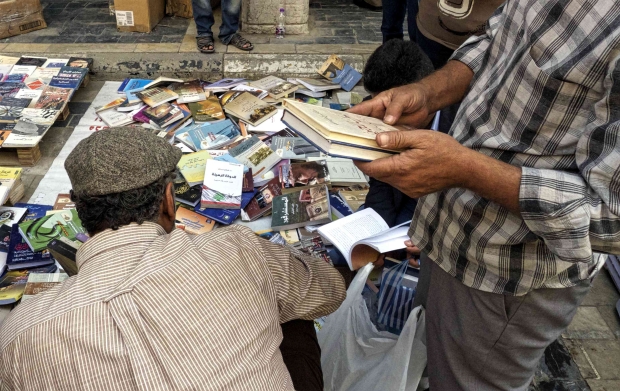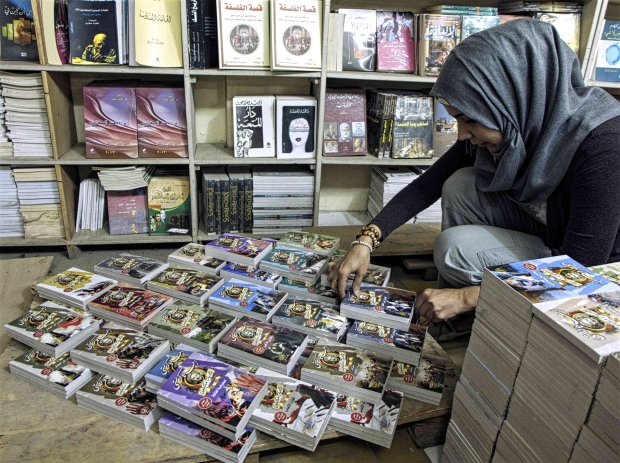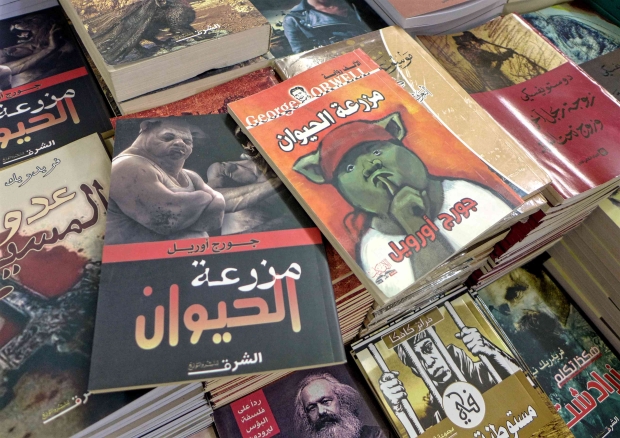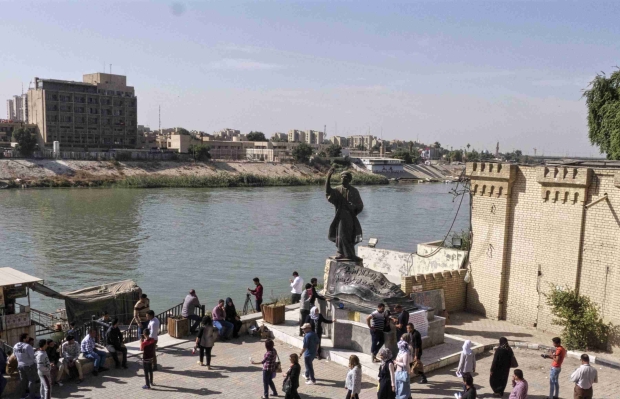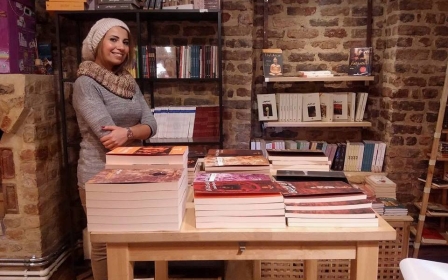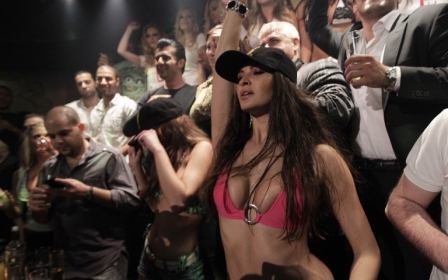The booksellers of Baghdad: Sherlock Holmes, Harry Potter among top titles
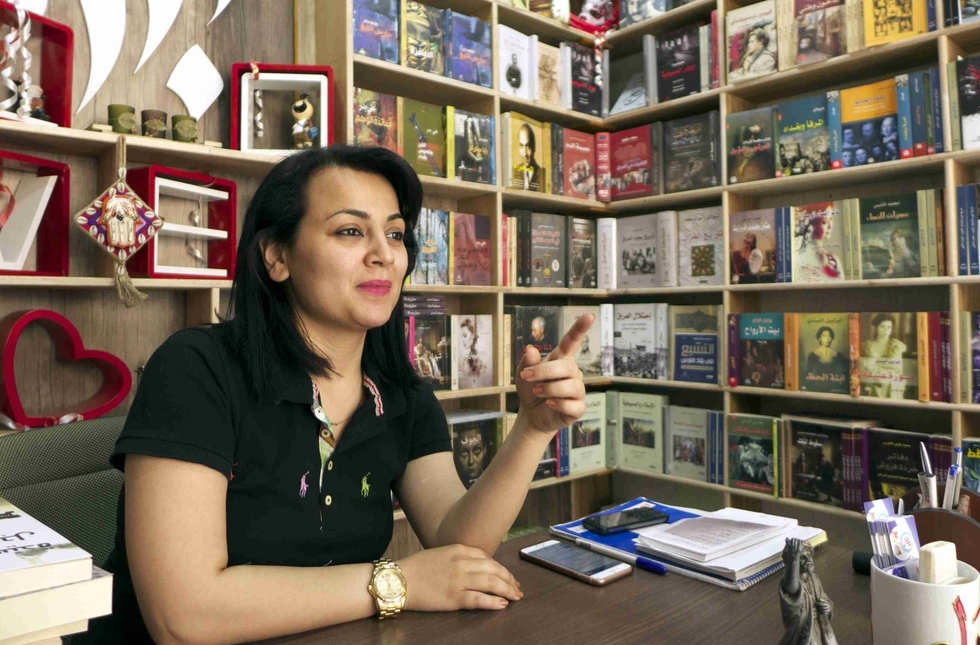
Every Friday, one street in Baghdad is lined with books. They are carefully laid out across the pavements by sellers, anticipating the weekly throng of customers, as thirsty for the light entertainment of translated novels as for modern self-help books and political biographies.
“I’m selling more than 10 a week of this one,” says bookseller Ali, 48, gesturing towards a copy of Richard Dawkins’ The God Delusion, translated into Arabic.
“It’s the most popular non-fiction book for young Iraqi guys at the moment. The problem here isn’t with Islam but with Islamic politics and the government of Iraq. So people start looking for other answers. Darwin’s theories of evolution are also very popular, as is the dialectic philosophy of Marx and Hegel.”
Biographies of Winston Churchill, Che Guevara and Nazi general Erwin Rommel rub spines with George Orwell’s 1984, Adolf Hitler’s Mein Kampf, the collected works of William Shakespeare and contemporary self-help book The Secret.
From reading these books, I have learned that we hold the power to change ourselves and then the world around us
- Helen Fadel, Iraqi book lover
Ali has just sold his last copy of Salman Rushdie’s The Satanic Verses - the controversial novel which led to Iran’s former leader Ayatollah Ruhollah Khomeini issuing a fatwa in 1989 calling for Rushdie’s death. He is awaiting new stock.
“Ordinary people buy these books, not just students,” he says, bending to straighten a few books on the pallets that serve as his stall. “Both non-fiction and fiction, although I generally do sell more novels.”
Holmes, Harry Potter, Hercule Poirot
Baghdad’s Mutanabbi district, the city’s cultural quarter, was named after 10th-century Iraqi poet Abu at-Tayyib Ahmad ibn al-Husayn al-Mutanabbi al-Kindi, lauded as one of the greatest of Arab poets.
The area was pedestrianised after a devastating car-bomb in 2007 killed more than 100 people, including all the children of the owner of the oldest cafe in the area. He later reopened in their memory.
The vehicle ban attracted more part-time booksellers to the area, who were able to use the pavements to display their wares. As people crowd around the bookstalls, so the permanent bookshops lining the street also do a thriving trade.
The owner’s son Murtadha Ali Hadi, after whom the shop was named when it opened 20 years ago, says his bestsellers are detective novels translated into Arabic.
“Dan Brown is very, very popular because Iraqi people love mysteries and puzzles and this book is full of those,” he says, patting a stack of more than 50 red-covered copies of The Da Vinci Code.
“Students and young people love detective fiction, especially English detective fiction written by Arthur Conan Doyle and Agatha Christie.” Murtadha is waiting for stock of Sherlock Holmes novels to arrive from a publisher in Egypt, where many of the books he sells are printed.
'Dan Brown is very, very popular because Iraqi people love mysteries and puzzles and this book is full of those'
- Murtadha Ali Hadi, Al-Murtadha Bookshop
“George Orwell’s Animal Farm is also very popular because it describes a similar situation to that in Iraq,” he says. Other customers - children and adults alike - are looking for the escapism that literature promises. The shop stocks all the Harry Potter books, both in English and translated into Arabic.
In one corner, the shops’s newest employee, Helen Fadel, 32, is arranging a display of Agatha Christie murder mystery novels.
“My passion for books started two years ago, when I read a book by [the late Egyptian self-help guru] Ibrahim El-Fiki called Start your Life Peacefully,” she explains, listing the titles of his other works she was then inspired to read. El-Fiki’s many books on human development propound the power of positive thinking and encourage readers to believe they can transform their lives by pursuing personal dreams and ambitions with positivity and determination.
“Many people in countries like Egypt, Iraq and Syria are confused, and are living confused lives," says Fadel. Here, for example, we have had a very bad situation for the last seven years but facing ourselves is the first step to living peacefully and finishing all these wars.”
Al-Murtadha Bookshop stocks 25 different titles by El-Fiki, each stacked 30-deep. “The change from a dictatorship to a democracy is like falling from a mountain and the landing for Iraq was very hard,” Fadel says.
Some customers seek more unconventional paths to self-improvement. Some buy Say It Like Obama, which coaches the reader how to speak in a similar manner to the former US president “with purpose and vision” to boost communication and leadership skills. Obscurely, it is another current bestseller.
Murtadha says: “Recently we have been selling a lot of self-help books. But nothing outstrips Agatha Christie novels - they remain our absolute bestseller.”
The first female bookseller
Tucked away in the shadows of an Ottoman-era building is one of the newest bookshops in the district - and the first one run by a woman.
Diminutive Baraa Al-Hadi, 27, sits at her desk behind which the word LOVE is spelled out in painted wooden letters, surrounded by colourful decorations which stretch across the ceiling. “Not only am I the first female bookseller in Baghdad but the first in the whole of Iraq,” she says proudly.
'Saddam destroyed the culture of reading books in Iraq because he lived in fear of young people reading and questioning authority'
- Abdul Al-Hadi, retired judge
“I love books, and I love reading and I have always loved this book market so, after graduating in civil engineering, I decided to follow my dream and do something different.”
Although reluctant to discuss the problems she has faced since opening the bookshop four months ago, Baraa admits there have been challenges, and she always has a male family member with her in the shop. A friend confided that, without this, she would get a lot of unwanted male attention, from both locals and customers.
Her father is Abdul al-Hadi, a retired judge who now spends most of his days in Mutanabbi. “I’m here all day, every day, to protect my daughter from bad people and the evils of society,” he says. “I supported her through school, then college and now I am supporting her with this bookshop.”
He says that reading and book-buying are among the few activities in Iraq that have thrived since the overthrow of Saddam Hussein in 2003. “Saddam destroyed the culture of reading books in Iraq because he lived in fear of young people reading and questioning authority. He destroyed many unique books and then destroyed Iraq by endless wars.”
Islamic State stole boxes of law books
The last bookshop on the street is a wooden shack called Muhakim’s Library which has occupied that spot since 1950. It only sells law books. Owner Jamal Shahi says: “I inherited this from my father. I have 100 years of Iraqi law here, from 1917 to 2017, and we are one of the main suppliers in Iraq for law books.”
Shahi says business is good in Baghdad, but he has stopped his previously lucrative postal sales during the last few years.
“I stopped when Daesh [Islamic State] came to Iraq because the situation changed and it started to happen that I would send out the books but then people wouldn’t send the money,” Shahi says.
Mutanabbi’s bookshop-lined street leads towards some of the city’s older historic buildings and art galleries, which open out onto a paved square beside the expanse of the Tigris River.
Hundreds of people gather here on Fridays, not only to buy books, but to visit art exhibitions or hang out with friends and take "selfies" by the river
Overlooking them all is a statue of Mutanabbi himself, hand outstretched in a perpetual attitude of proclaiming verse.
New MEE newsletter: Jerusalem Dispatch
Sign up to get the latest insights and analysis on Israel-Palestine, alongside Turkey Unpacked and other MEE newsletters
Middle East Eye delivers independent and unrivalled coverage and analysis of the Middle East, North Africa and beyond. To learn more about republishing this content and the associated fees, please fill out this form. More about MEE can be found here.


